Pandemic babies show signs of decline in cognitive performance
Babies raised in the isolation of the pandemic had an unexpected start to life, and the results are showing. What happened – and will it be permanent?
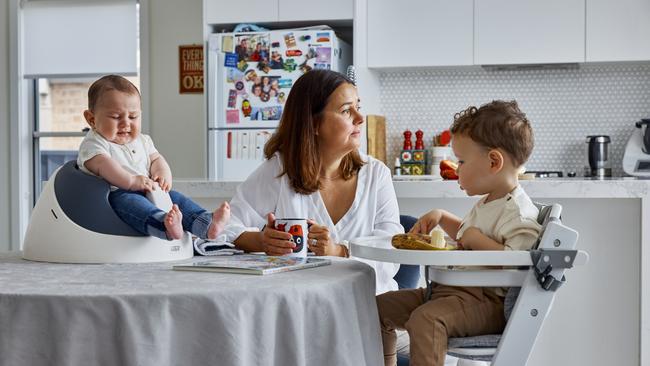
Until she became a mother, certainty was an underrated commodity in Paz Llorca’s full life. For most of her 40 years she had walked a pathway paved with assumptions. Born in Spain, she could and did move overseas to work as a civil engineer, first to the US and then in 2011 to Australia, where she met her Irish partner Dave and they bought a home on the NSW Central Coast.
When she became pregnant with their first child, new expectations emerged. “My mum was coming to be here in July when the baby was born, and then Dave’s family was coming,” she says of the plans crafted around their newborn’s first weeks of life. The couple had planned, too, to travel to Europe that Christmas with their baby, to meet their extended clans. “So basically we had the first six months sorted.”
With no relatives in Australia and no close friends nearby who could assist, “I couldn’t really think about it any other way”. Even as she parted from her parents at Madrid airport at the start of 2020, in the first half of her pregnancy, and briefly wondered about the potential impact of an emerging coronavirus, her future visions were still mostly grounded in assurances. “I said, ‘Imagine if you guys couldn’t come’, because we had started to hear about Covid. And they said, ‘No way. From now to July, Covid will be resolved’.” Buoyed with expectation, she flew back to Australia. “When we said goodbye, we said, ‘See you soon.’”
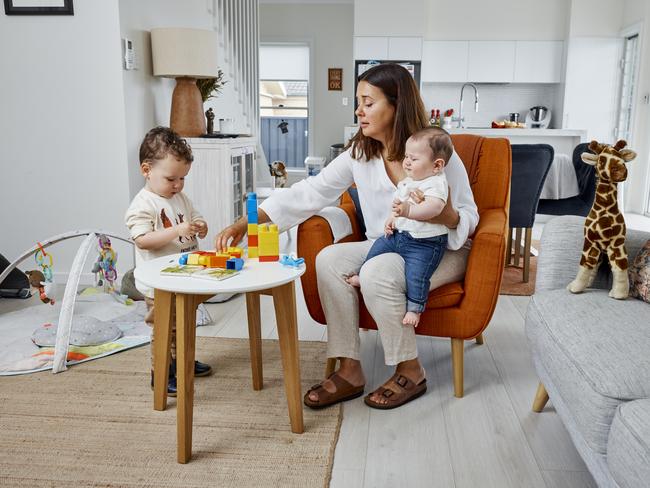
By the time Jack O’Shea Llorca was born that winter, certainty was a luxury. The rapid global spread of the virus had locked down countries and separated families, and around the world new parents found themselves isolated. “I think that was the hardest time of my life,” Paz says now. “The feeling of being lost and the unknown, of not knowing how long it is going to go on for. And then the feeling of being alone.”
It might take a village to raise a child. But what happens when that village is shut down, even temporarily? More than 200 million infants have been born since the onset of the pandemic, and depending on where they live, they have been brought into the world during varying periods of isolation. Babies are not immune to adversity. Generations have been born to wars and famine, bushfires and floods. But none have come into a world quite like this. “It’s a global phenomenon and we have never had anything on this scale in terms of impacting everybody around the world at once,” says paediatrician Professor Sharon Goldfeld.
Even during wars babies can expect to be exposed to a variety of people. The lockdowns of homes and countries that kept many safely inside in recent years added a layer of isolation for every demographic, but especially children. By October 2021, according to Save the Children, youngsters around the world had stayed indoors for an average of six months since the pandemic’s start. As a report on the potential indirect impacts, published in the Medical Journal of Australia last year, notes: “Children are facing a ‘generation-defining disruption’.” And medical authorities are wondering if some of the most significant effects might be on those born during the height of the pandemic.
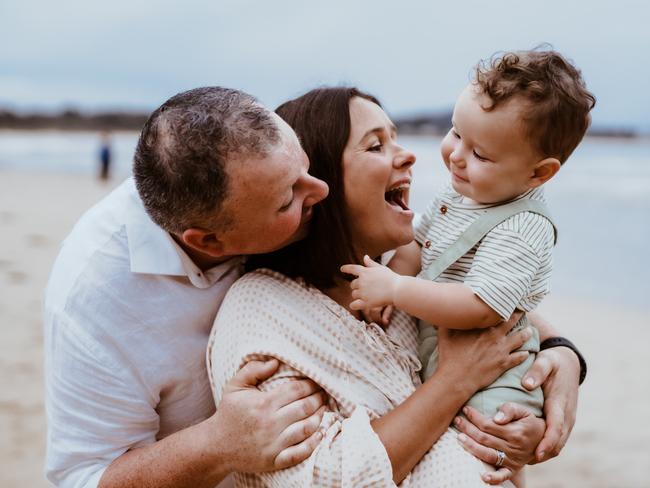
For Paz Llorca, her husband and their baby, months of social disconnect culminated at the end of that strange year. “Christmas 2020 we didn’t celebrate because I was so sad,” she says. For Jack’s first Christmas she didn’t even put up a tree. Instead she and Dave took their baby to a cottage on the south coast where they passed the days alone. “That was probably the toughest time … just having this baby that no one had met, and being away from my family at that time and not knowing when we were going to meet again, it was just unbearable.”
By the time Jack was finally cuddled by his adoring maternal grandparents in the middle of 2022, he was a shy two-year-old. He was also a big brother to Frank, who was born in May and whose first months were noticeably more upbeat, even though both siblings are being raised by the same parents and in the same toy-filled house. “It feels completely different with Frank,” says Paz, whose mothers group second time around has expanded from five to 15, and whose second-born already seems more outgoing and interactive.
While Jack attends childcare and regularly socialises, he dislikes new people and new environments. “But I don’t know if that’s his nature or if it’s to do with the fact that he was just with me for such a long time,” says Paz, who worries about the incremental effects of those restricted early months for the pandemic’s first babies. “They’ve grown without seeing people talking,” she says of the dearth of people followed by the abundance of masked faces they initially encountered. “I have cried so much because it made me so sad, my mum as well … the birth of a baby should be a family event.”
“By the time they were one, a quarter of them had not met a child their own age”
A child’s first 1000 days are crucial for brain development. When babies are spoken to or touched, neural connections are built in their brains. Early environments shape their development and wellbeing. For babies born since the first lockdowns in early 2020, those 1000 days have ended and early studies show some notable legacies from their formative months.
Some social and communication skills appear to have been impeded, at least initially. In a recently released Irish study, pandemic babies met fewer communication milestones by the time they were one than pre-pandemic babies; they had a harder time communicating and tended to have very small worlds.
Comparing hundreds of one-year-olds born at the start of the pandemic to others born in the years before it, researchers examined 10 parentally-reported developmental outcomes, including the ability to crawl, stand alone, point at objects and wave goodbye. The pandemic babies were less likely to have one definite and meaningful word by the time they were one. They were also less likely to be able to point or to be able to wave bye-bye.
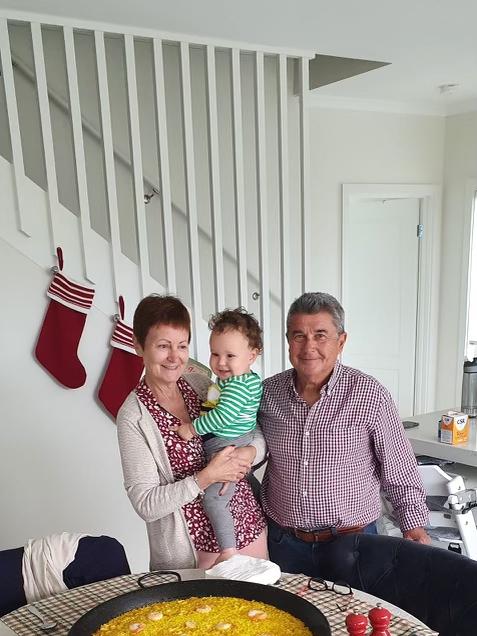
“Babies born during the early stages of the pandemic missed the opportunity of meeting a normal social circle of people outside the family home, including other babies and grandparents,” said the study, published in October in the Archives of Disease in Childhood. “Lockdown measures may have reduced the repertoire of language heard and the sight of unmasked faces speaking to them, while also curtailing opportunities to encounter new items of interest, which might prompt pointing, and the frequency of social contacts to enable them to learn to wave bye-bye.”
Some of the results had obvious origins. “If no one is coming to your house, there is nobody to learn to say ‘bye-bye’ to,” says paediatric neurologist Dr Susan Byrne, one of the authors. And while babies learn to point before they acquire speech, “if you’re in the home environment mostly, they were not seeing things to point out”.
The study’s 350 children, all born in the first half of 2020, are still being observed. While results of their second year have not yet been published, some of the first year outcomes, Byrne acknowledges, are particularly sad. “By six months only three people on average had kissed the baby. And by one year, one in four had not met a child their own age.” Given that an unspecified number of the infants had no siblings, some of them, she adds, might never have even met a baby.
Other reports, also conducted over a comparatively short time, have echoed these results. A study of 255 babies born in New York between March and December 2020 found that being born during the pandemic was associated with neurodevelopmental differences once babies reached six months. By then, according to the study published in JAMA Paediatrics last year, the 2020 babies were exhibiting “significantly lower scores on gross motor, fine motor, and personal-social subdomains”.
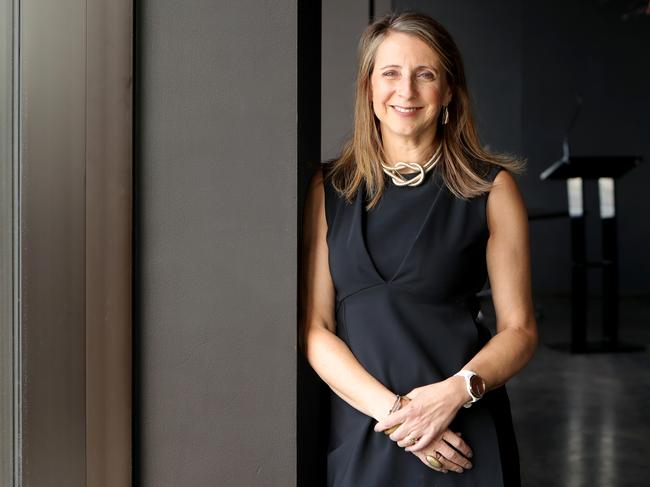
A 2020 Chinese study found a deficit in communication and fine motor skills among several hundred one-year-olds who had lived for up to three months in the pandemic. And an October report by researchers from the Harvard Medical School, who looked at 21,000 infants covered by eight observational studies, found that being born and raised during the pandemic was associated with the risk of communication impairment.
In their comparatively short lives, evidence is slowly emerging about the variety of impacts that public health measures have had on the youngest children. That list ranges from increased clinginess, anxiety and levels of stress to increased hyperactivity and inattention, according to a report last year from the Centre for Community Child Health at the Murdoch Children’s Research Institute. It found that in a pandemic that has brought “momentous changes to children’s lives, which has the potential to impact their health, development and wellbeing”, much of the impact has been the result of indirect effects, including lockdowns, increased parental stresses, financial hardship, and loss of social contact with family.
Those worries have been most notably borne out in a longitudinal study of children from Rhode Island in the US, running for more than a decade, with a preliminary paper released late in 2021. Now being peer reviewed, it found “a striking decline in cognitive performance” among pandemic babies. Verbal, non-verbal, and overall cognitive scores in children under three were significantly lower than over the previous decade, “with this difference amplified in infants” born since the start of the pandemic.
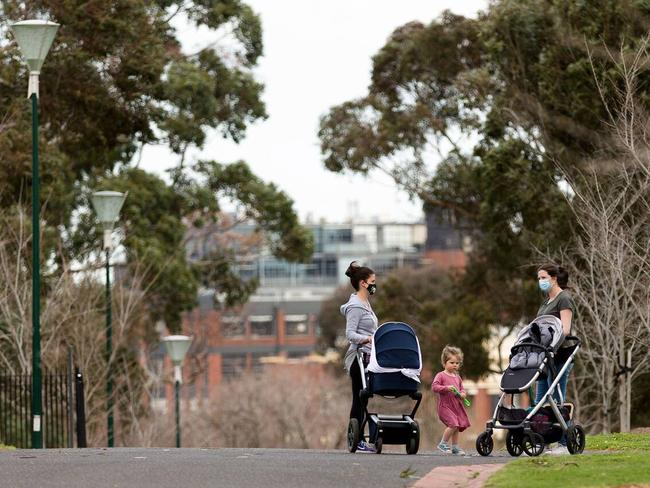
Children born in 2019 “seemed to be doing alright”, lead author Sean Deoni told the British Medical Journal. “It’s really affecting those born during the pandemic.” In tests including language and fine motor skills, their scores began to decline in 2020. “But it was in 2021 that the developmental deficit became significant.” As the pandemic has continued, those deficits have accumulated.
Covid’s legacies have been manifold for everyone, but for new parents and their babies they have carried a particular resonance. Across the country people have been “navigating pregnancy, birth and early parenthood through extraordinary circumstances, with more limited access to family and to formal supports and services,” the Australian Institute of Family Studies reported in March.
Everyone’s experience of adversity differs. Responses in the AIFS paper on becoming a parent during Covid ranged from exhilaration (“not even a pandemic can change the fact that having a baby is one of the most amazing and wonderful things you can do”) to devastation (“missing out on the joy of sharing our baby with their grandparents and aunty, losing that family support option, difficulties meeting other mothers for support, anxiety about taking the baby out of the house, financial stress.”)
“Babies are resilient. I’m hopeful that everything will be fine. But it’s too early to say”
“It was a very small world,” concedes Melbourne teacher Loretta McKail, whose first child Madison was born in April 2020, just as the nation was experiencing its early uncertain weeks of lockdown. Isolation was a defining factor of her daughter’s birth in a private hospital, where only Loretta’s partner David was allowed in. Long-held assumptions that their extended family would share in the baby’s early weeks of life evaporated. “There was no one in the hospital with us. It was literally just us for five days learning how to be parents.”
When they brought their baby home, to a world in which nappies were in such short supply that friends in other suburbs had to post them packets, Madison’s isolation continued. “People couldn’t meet her until she was old. My mum met her when she was six weeks old, and my husband’s parents, because they were regional and couldn’t cross into metro, they met her at ten weeks … We were worried a little bit about how she would go growing up, her social development. We didn’t know – we’re first-time parents – but if there’s only me and my husband holding her in the first few months, then we added in grandparents, and even then there wasn’t much beyond that in the first six months …”
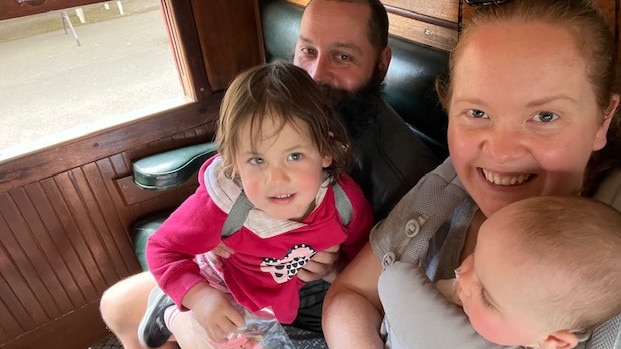
Madison has been attending childcare since before her first birthday and her language is developing well. “I talked non-stop to her, knowing that helps,” her mother says. But her social development, she adds, might have been impaired in the short term and she is shy around new people, especially compared to her sister who was born in May last year.
In a matter of months Lucy has already been exposed to much more of the world, and its residents, than her older sibling. “She seems to be developing a lot quicker in terms of milestones and rolling over.” Her mothers groups are in person, not online, she has been cuddled by countless people and she seems unfussed about whomever she is around.
Her big sister Madison, on the other hand, was not around other children for the first eight months of her life. “It’s certainly a time of significance,” Loretta says of her firstborn’s birth. “I am not negative about it. I don’t think back and go it was awful. But now having had my second baby I see the potential of what it could have been like.”
The pandemic’s firstborns are approaching their third birthdays. “The question on the table is, what is permanent and what is not?’ says Goldfeld, theme director of population health at the Murdoch Children’s Research Institute. No one knows if the impacts detected in this cohort will endure. Byrne, for one, is optimistic. “Babies are very resilient and inquisitive,” she says. “I would be hopeful that everything would be fine. But it’s too early to say.”
Most studies that have examined this group stress that the children will need to be followed up, possibly until school age, to ensure that natural resilience and inquisitiveness sees them through the challenges of their early lives. Some of the best insights may well come from an area whose children felt isolation more keenly than most – in Victoria, where a long-term project has begun to track babies born from 2021 to 2023. GenV is one of the world’s largest birth and parent cohort studies. Every family with a newborn in the state is being invited to join over a two-year period from October 2021. Already close to 60,000 babies and parents have been signed up.
While they are at the start of a long process, some insight can possibly be gleaned from children who have already faced adversity of a different kind in Australia. Over several years, local and Canadian researchers found that babies born to parents who experienced significant stress as a result of the 2010-11 Queensland floods showed deficits in problem-solving and social skills when they were six months. But by 30 months, things looked different. The more supportive that parents were, the better their children seemed to be – a reassuring reminder of the power of love.


To join the conversation, please log in. Don't have an account? Register
Join the conversation, you are commenting as Logout